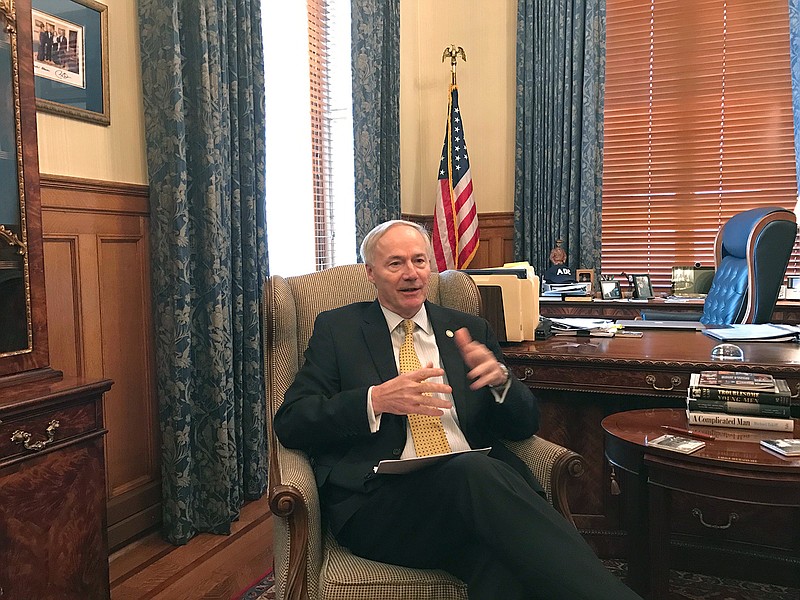LITTLE ROCK-After an aggressive plan to execute several inmates by the end of April put him and Arkansas at the center of the national death penalty debate, Gov. Asa Hutchinson was poised to return to a more familiar role as policy wonk with a special session focused on the state's hybrid Medicaid expansion. But lingering questions about the last execution-which included an inmate convulsing and lurching 20 times on the gurney-is going to make shifting attention to other issues a difficult task.
Just how much the session set to begin Monday will be overshadowed by questions about the execution of Kenneth Williams and calls for an investigation into potential problems was clear when Hutchinson appeared before reporters late last week. The bulk of his 30-minute press briefing focused on the execution, with a handful of questions about the state's $70 million budget shortfall and none about the Medicaid plans that will dominate the session.
Hutchinson dismissed calls from death penalty opponents and Williams' attorneys to call for an independent investigation into the lethal injection, saying he didn't see a need for anything beyond a routine review of the execution procedure. Hutchinson asserted there isn't any evidence that Williams felt pain during the execution.
"I think it's totally unjustified," Hutchinson said. "You don't call for an independent investigation unless there's some reason for it."
Hutchinson's comments, however, are unlikely to quell calls for a deeper review into an execution that death penalty opponents are pointing to as another example of the problem with midazolam, the sedative used in Arkansas' three-drug lethal injection process. The state's initial plan to execute eight inmates over an 11-day period was set by Hutchinson because the state's supply of the drug was set to expire on Sunday. Arkansas instead put four men to death over an eight-day period, after half of the executions originally scheduled were halted by the courts.
A federal judge on Friday ordered Arkansas to preserve evidence from Williams' body, including blood and tissue samples, which are signs more legal action is likely.
Arkansas' lethal injection protocol won't be on the agenda when the Legislature convenes this week and it's unlikely to come up when the governor addresses a joint House and Senate session, but the questions about the execution could hover over the session nonetheless.
The special session is focusing primarily on Hutchinson's plan to impose new restrictions on the state' hybrid Medicaid expansion, which uses federal funds to purchase private insurance for the poor. Hutchinson's proposing lowering the program's eligibility cap, which would move 60,000 people off the expanded coverage, and adding a work requirement for participants.
Hutchinson has touted the changes, which would need approval from the Trump administration, as innovations in health care that could be models for other states. Before the wrangling over the state's execution schedule, the proposals seemed to give the Republican governor and the state a spotlight while the future of the federal health care law remained hazy. But any attention those changes could garner pales in comparison to the national and international scrutiny Arkansas has faced over its multiple execution plan.
Hutchinson came across as a reluctant figure over his decision to push for the executions, calling it a part of his job to carry out the law. That reluctance was again apparent the day after Williams' lethal injection, when Hutchinson was asked when he'd feel comfortable having the state carry out more executions.
"I really don't even want to think about it right now, quite frankly," Hutchinson said. "You know that I do my responsibility, so if the attorney general sends over names that are subject to execution we will start the process over again in terms of dates, in terms of access to drugs. Even though these victims have had justice in the cases of the four, there's a number of others waiting for justice."
Andrew DeMillo has covered Arkansas government and politics for The Associated Press since 2005.

